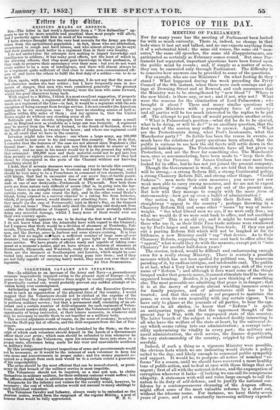Irttrro to frattar.
EXISTING MEANS OF DEFENCE.
&B.—The letter in last week's Spectator from a "New Subscriber" ap- pears to me to be more sensible and practical than most people will allow, and I perfectly agree with him in most of his remarks.
I have always thought that the very best recruits for the Army are those taken from the agricultural population ; in fact, those who are ablebodied, accustomed to rough and hard labour, and who almost always (as he says) find their position much better in a regiment than in their own locality. I do not undervalue the attempts now making to impart knowledge and intelligence to soldiers ; it has many good effects, not the least of which is, the showing officers, that they must gain knowledge in their profession, if they wish to preserve their ascendancy over their men : but you do not want every soldier to be a man of intelligence and there will almost always be in a regiment quite sufficient of that class to make non-commissioned offi- cers of, and leave the others to fulfil the first duty of a soldier—viz, to do as he is told.
Then, again, with regard to moral character, I do not say that the man of bad character makes the best soldier ; but I have frequently seen in mo- ments of danger, that nien who were considered generally "the greatest blackguards," (as it is technically termed,) were the men who came forward, whilst the good characters hung back.
With regard to a Militia, I think it a most excellent suggestion, if properly embodied ; but then, a regiment of Militia would cost nearly if not quite as much as a regiment of the Line—in fact, it would be a regiment with the sole exception of being exempt from foreign service. I do not consider the American militia to be an analogous case : they have no standing armies of half-a- million within fifty miles of them ; and my opinion is, that the United States might do without any standing army at all. Railroads and the electric telegraph have done much to make a small army in England now as available as a large one was formerly. A regiment may be moved from the West of Ireland, or the South of Scotland, down to the South of England, in twenty-four hours ; and where one regiment could do it, all could that we have in the country.
Invasion might take two shapes : one where a large army, say 100,000 men, would be sent over to try and conquer this country. Now, to do that, I consider that the features of the case are not altered since Napoleon's (the Grand) time : he made it a sine qua non that he should be master of the Channel; and no man in his senses would try it in the present day without that command : 100,000 men and their material could not be put into less than seventy or eighty steamers; and could those steamers (even if they had them) be congregated in the ports of the Channel without our knowing something about it?
I hold, that if seventy steamers were coming over to invade this country, thirty would be quite sufficient to frustrate and hinder the landing ; and I should be very sorry to be a Frenchman in command of ten steamers, loaded with troops, that had to encounter one of our screw line-of-battle guard- ships. The other case is where a force of 10,000 or 15,000 men made a dash at one of our dockyards—Portsmouth or Plymouth. Now both these ports are from nature very difficult of access (that is, in going into the har- bour) ; there is no straight channel in either : the vessels must take a cir- cuitous route, in one case round the Spit, and in the other round Drake's Island, being exposed in a narrow ehannet to a raking fire from batteries, which, if properly served, would disable any attacking force. It is true that they might (in the ease of Portsmouth) land in Stoke's Bay, on the Gosport side ; but cut bono ? They could only shell the shipping and dockyard from outside the fortifications of Gosport; and I think most probably without doing any material damage, whilst I fancy none of them would ever see their own country again.
Our great danger appears to me to be during the first week of hostilities. I do not know what plan the Admiralty have with regard to the Channel; but I suppose that there would be a division of steamers at Pembroke, Fal- mouth, Plymouth, Portland, Portsmouth, Shoreham and Newhaven, Dunge- ness, and the Downs, some in harbour and some always cruising. It is true that at first we might no* have a sufficient number of large man-of-war steamers ; but any steamer with a eouple of guns light or heavy would do some service. We have plenty of officers ready and capable of taking com- mand at a moment's notice, and we have always a division of steamers at Portsmouth, Plymouth, and Woolwich, ready for sea ; in addition to which, there are the steamers at Southampton and London which might be con- verted into man.of-war steamers by putting guns into them ; and if they are not fully capable of 'carrying heavy metal, they must run over their an-


























 Previous page
Previous page